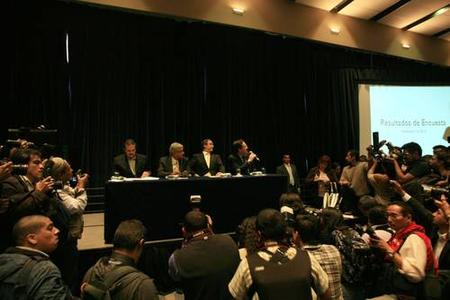With the virtual nomination of Andrés Manuel López Obrador (AMLO) as presidential candidate of Mexico’s multiple lefts last week, the 2012 Mexican campaign began to define itself. Two independent polling agencies confirmed what followers of Mexican politics already knew: López Obrador, the left’s 2006 presidential nominee, is one of the most popular and charismatic figures on the left (and if we don’t subtract points for the way some citizens feel about his abrasiveness, perhaps across the political spectrum), and he is also one of the most polarizing.
 Under a pact agreed to and abided by the two principal pre-candidates of the left, López Obrador and Mexico City mayor Marcelo Ebrard, the left’s 2012 presidential candidate would be determined by a pair of polls conducted by independent agencies, the design of which was approved by both candidates. The polling design was meant to measure the electoral strengths and weaknesses of the two candidates.
Under a pact agreed to and abided by the two principal pre-candidates of the left, López Obrador and Mexico City mayor Marcelo Ebrard, the left’s 2012 presidential candidate would be determined by a pair of polls conducted by independent agencies, the design of which was approved by both candidates. The polling design was meant to measure the electoral strengths and weaknesses of the two candidates.
AMLO and Ebrard agreed that the candidate with the most favorable polling scores, as measured by responses to five questions asked by pollsters, would be the candidate of a coalition of three leftist parties: AMLO’s Party of the Democratic Revolution (PRD), the Labor Party (PT), and the Citizens’ Movement. López Obrador polled better on three of the five questions, was declared the winner (and, informally, the candidate), and was immediately congratulated by the loser, Ebrard. Given the way the questions were written, it was no surprise that AMLO won.
Ebrard scored better on an open-ended question in which favorable and unfavorable opinions of the candidates were balanced against one another, and on a question that asked, “Which of these potential candidates (on a list of six) would you never vote for?” These were the questions that measured AMLO’s negatives.
AMLO scored better on a question asking respondents for a head-to-head preference between the two candidates and on questions asking, who (among a list of six potential candidates) respondents would vote for, and who (on that same list) they would prefer to see as president. These measured AMLO’s positives.
The two candidates announced the results in a press conference last Tuesday afternoon. AMLO formally announced that he would now seek the candidacy of the three-party leftist alliance, tentatively called the Progressive Movement, and Ebrard gave him his full support.
It now remains for AMLO to spell out just what he means by “progressive.” His discourse has been sharp, especially concerning his identification with the poor, but short on details. If he does project a progressive perspective, he will force his center-right rivals to spell out their own plans for governance amidst economic, political, and social crisis. If this happens, and the debates move beyond the character assassination that both U.S. and Mexican readers know too well, it may shape up to be an interesting—even educational—campaign.
At the end of the day, Ebrard has actually emerged the winner in the eyes of many, graciously accepting defeat in the interests of his party and a united left. This puts him in a strong position looking far ahead to the elections of 2018, makes him a “moral leader” of sorts within the PRD and the left in general, and allows AMLO to carry the party banner (and perhaps the party burden) in what looks to be a difficult season for the PRD and its allies.
For more from Fred Rosen's blog, "Mexico, Bewildered and Contested," visit nacla.org/blog/mexico-bewildered-contested. See also "The Mexican Lefts Pick a Candidate," November 15, 2011; the May/June 2011 NACLA Report "Mexico's Drug Crisis"; or NACLA blogs Border Wars and Traffick Jam, for more on the U.S.-Mexico border or drug trafficking in the region.

